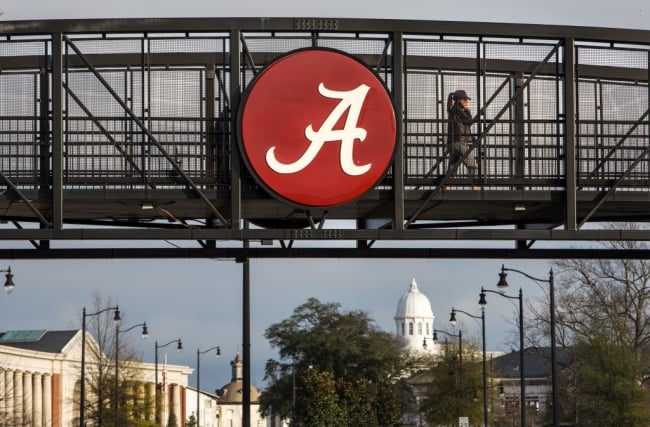You have /5 articles left.
Sign up for a free account or log in.

All University of Alabama system employees must sign the agreement by Friday, Oct. 8.
The Washington Post/Contributor/Getty Images
Employees in the University of Alabama system office received an email out of the blue last Friday asking them to sign a confidentiality agreement that would effectively prohibit them from speaking to anyone outside the office about their work.
The agreement -- first reported by Lagniappe, a weekly newspaper in Mobile, Ala. -- would apply even after someone is no longer employed by the system. Everyone who works in Sid McDonald Hall, which houses the system administration offices, is required to sign the agreement by Friday, Oct. 8, according to an email from human resources manager Jessica Harrison, which Lagniappe provided to Inside Higher Ed.
Those who violate the agreement could be fired and subject to “any other available legal or equitable remedies.”
The agreement’s definition of confidential information is broad and appears to include all nonpublic information that system office employees might handle or come across throughout their workday.
“Without limitation, ‘confidential information’ includes information or data concerning: operations; trade secrets; audit matters; compliance matters; ongoing, threatened or potential litigation; intercollegiate athletics; internal or external communications; financial plans, budgets, reports or operations; employee matters; contracts, grants and other agreements; negotiations; intellectual property (patents, trademarks, copyrights, etc.); research; academic matters; notes, plans and any other information that is generally not available to the public or to people outside” the system, the agreement stated.
Employees may not disclose such information to anyone outside the system unless they are given permission by their supervisor or are required to by law, according to the agreement. They also may not “examine, copy or retrieve any hardcopy or electronic document or file,” except those they have access to for a direct work assignment or have otherwise been authorized to handle.
The confidentiality agreement even prohibits employees from having conversations about work with “family, friends, or anyone else that may result in the disclosure of confidential information.”
Ann Franke, a higher education consultant with Wise Results LLC, said that understanding exactly what the agreement means by “non-public” information is key to understanding how it will limit Alabama system employees. She also noted that requiring all employees to sign such an agreement is unusual.
“It would be a common expectation for the senior leadership to have either a formal or informal understanding about nondisclosure of sensitive information,” Franke said. “If this agreement is being given to everybody -- if the groundskeeper or the server in the system-level dining service is subject to this agreement -- that would be extremely unusual.”
Rob Holbert, co-publisher and managing editor of Lagniappe, wrote about the agreement for the paper Tuesday. Holbert has covered financial irregularities at the system for months, and he suspects the confidentiality agreement may be a response to his reporting and repeated requests for information.
“There’s been an effort to just shut this down from the beginning,” Holbert said about his reporting. “They’ve ignored open-record requests. Basically any questions that I ask them, they just don’t answer. They don’t respond.”
Hours after Lagniappe published its story, Sid J. Trant, general counsel and senior vice chancellor for the system, sent an email to employees in Sid McDonald Hall, saying his office would investigate a “breach of confidentiality,” according to Holbert.
“This is to advise you that we have been made aware of these inappropriate sharing of business information -- a breach of confidentiality -- by someone within SMH,” Trant wrote in the email. “We will thoroughly investigate this matter. Please let me know if you have any information that might bear on this issue.”
Holbert believes the investigation is likely a response to his story about the confidentiality agreement.
“It’s a bizarre situation, especially when you consider that I don’t really think that any information that has been quote-unquote leaked to me is actually confidential,” Holbert said.
When asked about the investigation, Lynn Cole, director of system communications, told Inside Higher Ed that she did not have information to provide on “any potential investigation, but I can confirm the UA System Office investigates any suspected breach of policy and takes such matters seriously.”
The system has asked some employees to sign a confidentiality agreement in the past, according to Cole. Now, all employees are being asked to sign it.
“The UA System Office oversees three doctoral research universities and a health system, which requires the protection of confidential information. These guidelines and expectations are outlined in the employee handbook,” Cole wrote in an email to Inside Higher Ed Wednesday. “For the past several years, the UA System Office has required employees who regularly deal with confidential information to sign a standard confidentiality agreement. Because all UA System Office employees have access to sensitive information, the requirement was extended to all employees, effective FY2021.”
The employee handbook does include a section on confidentiality, though it is far less detailed than the agreement sent to employees last week. The handbook notes that employees “should not participate in or allow the unauthorized access, use, review, disclosure, dissemination, alteration, or destruction of confidential information,” which includes information and records that are protected by federal laws including HIPAA and FERPA. It also bans employees from discussing information that is related to a Title IX investigation or protected by state law.
Cole insisted the office did not expand the scope of its confidentiality policy and pointed to the last line in the handbook’s confidentiality policy, which prohibits employees from sharing any information that is not public or subject to an open-records request.
“The confidentiality agreement simply sets forth each employee’s understanding of the guidelines and expectations already outlined in the employee handbook,” Cole wrote.




